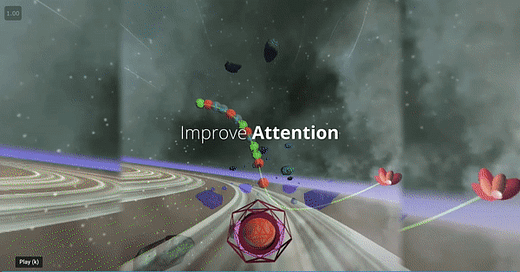Saks Snacks #5: Personal Health Dashboards, Psychedelic VR, Gratitude, and Longevity
🗣️Contextualized Voice Assistants, Jobs to be Done Framework, Hedonic Adaptation, and Much More!
Hello friends, 👋 ,
Happy Sunday! I can’t wait and am working on brevity so…
Let’s get to it. Here are 7 health tech snacks of the week that we’ll explore:
📡 Capital Raise Radar - psychedelic VR, mindfulness funding continues
👨💻Wearable Of the Week: personal health dashboards
💥 Spark Moment of the Week (from 2 years ago) - related to gratitude
🐦 Gratitude, Gratitude Savoring, and hedonic adaptation
🎙️ Podcast of the Week - virtual assistants, the future of audio, and wisdom
📖 Read of the week - The President's Council on Bioethics
♾️ Longevity + short list of societal implications
📡 Capital Raise Radar
#1 Psychedelic VR meditation startup Tripp raises $11M Series A | Read More
Tripp’s immersive experiences allow users to fully disconnect from the world around them, offering a hybrid between gamified, customizable free-form meditation experiences within a VR headset. The linked video helps understand it. I expect funding for mindfulness and mental health solutions/apps to persist.
The ultimate consumer problem is figuring out how to help people do the things they should do but don’t feel like doing. Solve that and people gain superpowers. If executed properly, I believe Tripp has that capability.

I’ve written about gamification and social elements being trends for emerging start-ups, and I see the same elements here. Watching this video alone shows how it gives consumers deeper, quicker meditative experiences and is worth keeping up with consumer traction and its efficacy to improve well-being.
👨💻Wearable of the Week: Personal Dashboards
With seemingly limitless options for tracking biomarkers, lab values, and indicators of health, it can be tough to actually make sense of the data.
Enter personal health dashboards.
Personal dashboards will continue gaining traction and become more mainstream over the next 3-5 years. These dashboards help individuals make sense of the robust data by focusing on the things that matter most, to each person.

The famous Peter Drucker “you can't manage what you can't measure” quote is especially relevant to health tracking. Combining apps + PHD’s give us an accurate look under the hood.
Headsup Health allows its users to build personalized, beautiful dashboards of important health data (deep sleep, blood sugar, HRV, ketones, lactate threshold, cryotherapy, etc). It integrates with the top devices and apps (Oura, FitBit, Apple Health, Keto-Mojo, EliteHRV) and allows for easy sharing with your health coach.
Another dashboard, Gyroscope, uses biometric data to unlock a comprehensive, personalized Health Score, available in a simple dashboard (computer + mobile).

This brings us to another component that emerges with PHD’s: coaching.
Gyroscope’s business model offers coaching for each product line, but the more affordable option leverages an AI coach whereas their “X” program pairs you with an expert that gives actionable guidance (and accountability) with your data.
I’m confident in wearable companies’ and personal health dashboards’ abilities to provide actionable, accurate advice, as I’ve witnessed the WHOOP insights become much more preventative and interactive within the last 6 months.

At the end of the day, there’s a race to build technology, software, and data science insight layers to bring actionable, helpful feedback to users, pairing insights with social connnection to boost accountability. It’s all about driving behavior change.
💥 Spark Moment of the Week
This week’s spark moment came 693 days ago, on August 25th, 2019.
This was a mundane observation but sprang to life almost 2 years later, proving that a “spark moment” doesn’t need to be electric in the moment.
Last week, I was asked on a podcast where my interest and commitment to gratitude journaling stemmed from, and I couldn’t answer the question myself… I’d done long-form journaling my Senior year at Cornell and while traveling Israel + Europe after graduation to relish the moments, but I couldn’t pin it.
Until I searched for “gratitude” in my Daily Moments spreadsheet. There it was.
8/25/2019 entry: Tried the 5 minute journal method and really liked it. Here's a quote from the article that introduced it which gives origin of Gratitude, which I want to remember. "Gratitude, derived from the Latin word gratia (meaning grace, graciousness or gratefulness)"
Out of the last 693 days, I’d say I started roughly 550 with written gratitude.
Some days are tough.
Other days the words flow seamlessly.
It’s rewarding to reflect back and realize that something that is such a large part of my daily life only started under 2 years ago.
What were you doing 693 days ago?
Challenge: start capturing some of life’s most beautiful moments. Start today. Start small. DM’s and email are open if I can help in any way.
🐦 Gratitude, Gratitude Savoring, and Hedonic Adaptation
I recently wrote a Twitter Thread on gratitude after a chat with Nicole Gabana, PHD, Director of Sport Psychology for UMassAthletics.
3️⃣ takeaways you’ll want to know:
Gratitude is a malleable trait, and practitioners display more neuroplasticity. Like anything else, the more we practice, the better we get.
Hedonic adaptation: when we get something better (think of a new phone or job promo), we quickly adapt to the new reality. We want something more.
Gratitude savoring: the act of deliberately enhancing the intensity and duration of positive experiences.
🎙️ Podcast of the Week - Contextual Virtual Assistants of the Future
If you enjoy mind-bending discussions from world experts, I recommend you listen to this podcast on the trajectory of voice assistants and our move into an era of contextually aware voice assistants. A few points stood out to me as “truths" as we move into an ambient and conversational computing era:
#1 Jobs to be done framework
The guest, Brian Roemmele, discusses how we currently “hire our phones” for different jobs to be done and argues that if you can “hire AI” properly (currently our phones) for jobs to be done, you can amplify your intelligence.
Personal assistants (think Siri) will be designed for individual “jobs to be done” on a daily basis. In the future, we’ll have daily briefings from these assistants that will give us time back.
#2: What is wisdom? I enjoyed Roemmele’s take:
“Wisdom = sum total of many experiences presented to you in a way that makes sense to you in that moment… it’s hard to capture wisdom because it’s a cloud.”

Wisdom delivered at the wrong time can sound like a fairy tale, but at the right time… and you might be brought to tears by how it reaches you at a gut level. Brian defends our mechanism that he refers to as the human feedback system.
How can we actually experience wisdom? Why can’t we tap into this intuition?
“The human is built with the perfect feedback system for when they actually see truth and see wisdom, and we’re denied access to that by being drowned by data and information. We’re overrun by it. The noise level is so high you don’t get to hear peak moments you should be hearing.
When Brian broke down wisdom around the 55 min. mark, it hit me on the gut level.
It’s why I wanted to share this piece on “contextual voice assistants”.
Through effective AI hiring for the different life ‘jobs” we have, it’ll free up our bandwidth, mental capacity to be more present in our everyday lives, and allow us to “hear” the peak moments we’re meant to hear.
📖 Read of the Week -
Beyond Therapy: Biotechnology and the Pursuit of Happiness (The President's Council on Bioethics Washington, D.C., October 2003) -
♾️ Longevity + societal implications:
There are unprecedented moral, ethical, and legal concerns stemming from the longevity progress we’re making.
About a month ago, I was shocked (and pleased) to find a report from 2003 written to George W. Bush from the President’s Council on Bioethics, who advised the President on bioethical issues that may emerge as a consequence of advances in biomedical science and technology.
Below are a few considerations to think through. (non-exhaustive)
Data Ownership/privacy: Who owns medical and genetic data?
Legal: Will we sue robots or algorithms for medical malpractice?
Philosophical: Could we define where the boundary is to augment life?
Social: What to do with biological differences widening the gap of the haves and have-nots?
Physiological: Where is the boundary of enhancing physical or cognitive human capabilities?
“Social scientists and government officials in Europe, where the median age is steadily approaching 50 (in the United States, the median age is 37 and rising more slowly), are already grappling with the economic and political fallout of a demographic time bomb: the continent's low birthrate and a longer-living population. “
While I’m optimistic about the benefits technology can provide, there are considerations that stakeholders (regulators, physicians, patients, to name a few) must consider and prepare for.
👋 Endnote & Calls to action
Thanks for reading! As always, I welcome all feedback and hope to hear from you.
👇🏼 Calls to action
If you like Saks Snacks, please share it on social media or forward this email to someone who might enjoy it. You can also “❤️” this newsletter by clicking the heart just below this, which helps me get visibility on Substack.
Find me on Twitter or email me if you have feedback or questions.
Until next time,
Adam Saks
PS: Lots of newsletters get stuck in Gmail’s Promotions tab. If you find it there, help train the algorithm by dragging it to Primary. It makes a big difference.




